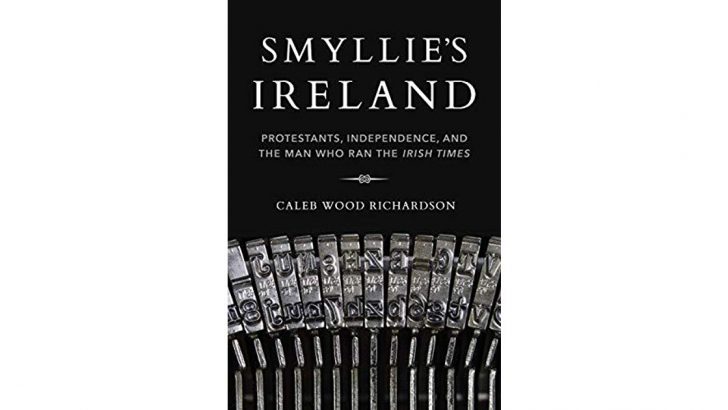Smyllie’s Ireland: Protestants, independence, and the man who ran the Irish Times
by Caleb Wood Richardson (Indiana University Press, $85 hb / $35 Pb and e-book)
Ian d’Alton
This book is a new take on an old subject. Using as a peg the larger-than-life editor of the Irish Times in the 1930s, 40s and early 50s, R. M. Smyllie, it has an original perspective on what it meant to be Protestant and Irish in the ‘National Catholicism’ of the newly-independent Irish Free State.
Richardson attempts a counter-narrative to the decline, decay, and dystopian Dostoyevskian story about southern Irish Protestants after independence. Instead of trying to explain the community in terms of failure, Richardson chooses to do so in terms of success.
He emphasises integration rather than alienation. As he writes of Smyllie: “A study of his life and the lives of those in his extensive social network reveals some of the qualities or strategies that successful southern Irish Protestants drew on to make their way in 20th-Century Ireland.”
Richardson identifies the characteristics that assisted the integration of Protestants – commitment to one’s locality, coming to terms with Protestant notions of British heritage, seeing themselves reflected in parts of the wider Europe, becoming ‘insiders’ in Catholic Ireland, using ethical and moral power where other forms – political, economic, social – were in decline.
Nature
He examines the nature of Protestant ‘loyalty’ to Britain through the prism of Smyllie’s activities as Times editor during World War II, especially his jousting with the censorship in this neutral state.
The author questions how different southern Irish Protestants actually were, using Smyllie’s attitude to the Irish language and how he managed it in the newspaper.
Richardson takes on the old ‘saw’ about Protestants being posh, rich, landed and alien; and shows that while the generality were none of these things particularly, the southern Protestant nexus was remarkably successful in maintaining themselves as part of a revitalised and reconstituted ‘Irish Establishment’ that arose in this conservative and pious state after 1922.
The author emphasises that this is not a full-dress biography of Smyllie. No archive of his papers survives, and thus Richardson’s construction – to see Smyllie’s life as illustrative – is clever.
In his concluding chapter, Richardson asserts that Smyllie followed southern Irish Protestant opinion as much as he led it. This is partly why he serves as such an effective means of understanding the experience of the broader group.
Richardson concludes that Smyllie exemplifies some of the ways in which southern Irish Protestantism succeeded in modern Ireland, as much “by deciding not to decline” by a host of concepts and actions designed to achieve it – a strong associational culture, a stubbornness in dealing with the organs of state and government, a cheekiness in appropriating the trappings and elements of the state where useful or appropriate (as with the celebrations of St Patrick in 1932), seeing themselves as embodying the “moral nation”, helping to run Ireland better, and so on.
Finally, Richardson sees southern Protestants as having “made their way back into the country that had left them behind”. This was, in the author’s words, “the Ireland that they loved”. As a community they still do.
Richardson identifies the characteristics that assisted the integration of Protestants”
The writing in this short but superb thought-provoking book is sparkling. What’s not to like about such insightful phrases as these:
“It would be needlessly tendentious to argue that the best way to prepare for life as a Protestant in Southern Ireland after independence was to spend a few years in a German internment camp.’ [Smyllie had been interned in Germany during the Great War].”
“To everyone’s surprise, the Paris Peace Conference turned out to be a conference.”
“…most of the snobbery of Dublin’s Protestants was self-inflicted: directed not at Catholics but at fellow members of the minority.”
Wonderful.



